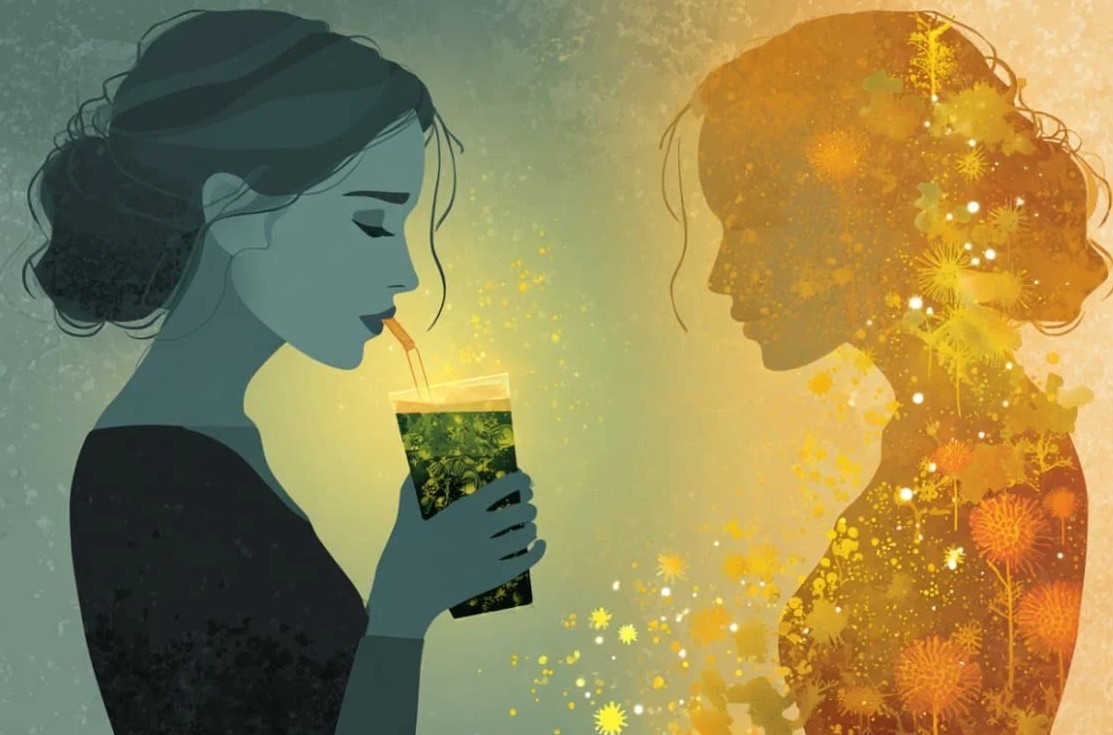Most of us are aware that sugary drinks are not beneficial for our physical health. But new research suggests they may also affect something far more unexpected: our mood.
A large and growing body of evidence now indicates that regularly drinking sodas and other sugar-sweetened beverages (SSBs) may increase the risk of depression, especially among women. Even more surprising? Scientists think the gut microbiome—the trillions of bacteria living in our digestive system—may play a key role.
Let us break down what the latest science is revealing.
Sugary Drinks and Mood: What Studies Are Showing
Researchers have been studying this connection for more than a decade, and their findings point in the same direction:
People who drink a lot of sugary beverages are more likely to experience depressive symptoms.
For example:
- A major 2024 study from the UK Biobank found that people who drank two or more sugary drinks daily had a 26% higher risk of developing depression.
- Artificially sweetened drinks did not fare better; the risk was even higher.
The effect remained even after accounting for lifestyle, genetics, and overall health.
The 2025 JAMA Psychiatry Study: The Breakthrough
A recent study published in JAMA Psychiatry (2025) may be the most important one yet. Here is what the researchers discovered:
- More soda = higher depression risk
Each extra daily serving of soda slightly increased the chance of having major depressive disorder (MDD), especially for women. - The gut bacteria changed
People who consumed more sugary drinks had higher levels of a bacterium called Eggerthella, a microbe linked to inflammation and poor mental health. - The gut–brain connection matters
Changes in gut bacteria explained a small but meaningful part of the link between soda intake and depression. It is the first time scientists have documented this pathway in such detail.
How Could Soda Affect Your Mood? The Gut–Brain Connection Explained
Scientists believe sugary drinks may influence mental health in a few ways:
- They disrupt gut bacteria
High sugar intake feeds inflammatory bacteria and reduces healthy ones that keep our gut balanced. This imbalance can lead to inflammation, a known contributor to depression. - They affect serotonin production
A large portion of the body’s serotonin is produced in the gut, where healthy gut bacteria play a key role in regulating its production and supporting communication along the gut–brain axis. When the balance of gut bacteria is disrupted, serotonin signaling can be altered, which may influence mood and emotional well-being. - They influence blood sugar and hormones
Frequent drinking of soda can cause blood-sugar spikes and insulin resistance, which may interfere with stress hormones and brain function over time.
Why Women May Be More Affected
The 2025 study found a stronger link in women. Scientists suspect this may be due to:
- Hormonal differences
- Unique immune responses
- A phenomenon called the microgenderome, where female gut bacteria behave differently
More research is needed to understand why, but this finding has been consistently observed.
Before You Panic, Here Is the Full Picture
Does soda cause depression? Not necessarily.
- These studies show association, not direct causation.
- People who feel low may also reach for sugary drinks more often.
- Many lifestyle factors like sleep, stress, and exercise play a role too.
Still, the evidence is strong enough that experts believe limiting sugary drink intake may benefit both physical and mental health.
What Does This Mean for You?
Here are a few simple takeaways:
- Cutting back on sugary drinks may boost your mood.
Even cutting back from two sodas a day to one can make a measurable difference, and gradually reducing your intake over time can help you eventually eliminate sugary sodas without feeling deprived. - Your gut health matters a lot.
Fermented foods, fiber, and probiotics can help support a healthy microbiome. - Pay attention to artificially sweetened drinks, too.
They are not always a safer choice. - Watch for mood patterns.
If you notice that soda leaves you feeling tired, irritable, or mentally “off,” it could be your body’s way of telling you that the extra sugar and additives are not agreeing with you.
The Bottom Line
Science is still evolving, but researchers increasingly agree on one thing:
What we drink affects not just our bodies but also our minds.
Sugary drinks can trigger changes in gut bacteria, inflammation, and brain-related pathways that may raise the risk of depression. While more research is needed to prove causality, reducing soda intake is a simple, practical step that may benefit overall health and emotional well-being.
As scientists continue exploring the gut–brain connection, one message is becoming clear:
A healthier gut could mean a healthier mood, and cutting back on sugary drinks might be a powerful place to start.
References
- Gastroenterology Advisor. (2025). Soft drink consumption linked to major depressive disorder.
- Jacka, F. N., Pasco, J. A., Mykletun, A., Williams, L. J., Hodge, A. M., O’Reilly, S. L., … Berk, M. (2010). Association of Western and traditional diets with depression and anxiety in women. American Journal of Psychiatry, 167(3), 305–311.
- Kahl, K. G., et al. (2022). Metabolic dysregulation in depression. Molecular Psychiatry, 27(3), 1332–1344.
- Knüppel, A., Shipley, M. J., Llewellyn, C. H., & Brunner, E. J. (2017). Sugar intake from sweet food and beverages and common mental disorder and depression. Scientific Reports, 7, 6287.
- Li, Y., et al. (2024). Dietary sugar intake and risk of depression: A systematic review and meta-analysis. BMC Psychiatry, 24, 5531.
- Maes, M., et al. (2011). The inflammatory and oxidative pathways in the pathophysiology of depression. Progress in Neuro-Psychopharmacology & Biological Psychiatry, 35(3), 676–692.
- Medscape. (2025). Soft drinks’ effect on the gut tied to major depression risk.
- News Medical. (2025). Drinking soft drinks may fuel depression by altering gut bacteria.
- O’Mahony, S. M., Clarke, G., Borre, Y., Dinan, T., & Cryan, J. F. (2015). The microbiome and neurodevelopmental disorders. Nature Reviews Neuroscience, 16, 339–352.
- Pan, A., et al. (2014). Sweetened beverage consumption and risk of depression among older US adults. Nutrition Neuroscience, 17(1), 13–21.
- Sánchez-Villegas, A., et al. (2012). Fast-food and commercial baked goods and the risk of depression. Public Health Nutrition, 15(3), 424–432.
- Science Media Centre. (2025). Expert reaction to study on association between soft drink consumption and depression.
- Sun, Y., et al. (2024). Consumption of sugary beverages, genetic predisposition, and risk of depression. BMJ General Psychiatry, 37(4), e101446.
- Thanarajah, S. E., et al. (2025). Soft drink consumption and major depressive disorder mediated by gut microbiota. JAMA Psychiatry.
- Willett, W. C. (2013). Nutritional Epidemiology (3rd ed.). Oxford University Press.
- World Health Organization. (2024). Depression: Key facts.
- PsyPost. (2025). New study links soft drink consumption to depression via the gut.

MBBS, FCPS, FACS, CPHQ, MPH
Director, Clinical Affairs – Oncology Division.
Clinical Scientist (Head and Neck Surgery, ENT Specialist)














